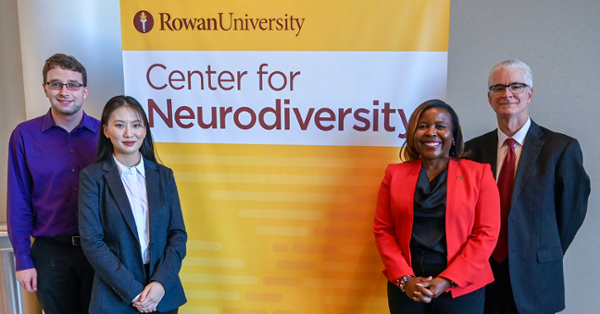Celebrating brain differences with more services and support
Celebrating brain differences with more services and support

On October 20, Rowan University announced an expansion of support and services, establishing a first in New Jersey Center for Neurodiversity on the Glassboro campus.
Rowan’s expansion of services for neurodiverse students stems directly from President Ali A. Houshmand’s commitment to access and inclusion throughout the University.
In 2019, Rowan became the first college or university in New Jersey to launch a full division dedicated to diversity, equity and inclusion. That same year, Houshmand committed to starting a Center for Neurodiversity.
“This is about human beings trying to be supportive of other human beings,” he said during a brief ceremony in Business Hall celebrating the new center. “For me, the issue is not just working with neurodiverse students while they are students, because that we can do. For me the bigger issue is what happens afterwards, when they graduate. I want to make sure they can function, run a business, create wealth and have a happy life.”
Rowan’s Center for Neurodiversity, which has a temporary home in Laurel Hall, will expand support and academic services to a wide range of students – often high-achieving individuals whose brains operate normally, though somewhat differently, than what is considered “neurotypical.”
Often, neurodiverse people have one or more condition, like attention-deficit/hyperactivity disorder (ADHD), Obsessive-Compulsive Disorder, dyslexia, or Autism Spectrum Disorder, that makes them think and act in ways not considered neurotypical. Experts say such conditions are simply differences in how brains work, not disabilities, and many very high achieving individuals have them.
“A world of difference”
The expanded commitment to neurodiverse students spoke directly to those like Terry Nguyen, who addressed the afternoon program.
Through eighth grade graduation, Nguyen was a straight A student, but in high school her concentration flagged, her grades flattened and then they went south – to Bs, Cs and, crushingly, Ds.
Reading assignments for AP classes that should have taken 10 minutes dragged on for 30 or more and still she didn’t absorb what she read. She felt confused, adrift and worried for her future.
“Recall was very difficult and I spent so much time reading things, especially for history and government, but there were similar problems with math and science,” she said.
Her junior year in high school Nguyen was diagnosed with ADHD, a common condition that affects brain development and can impact one’s ability to pay attention, sit still, even maintain self-control. Though she and her parents pleaded with school officials for assistance and accommodations, few were offered, and Nguyen never regained her stellar grade point average.
Today, the Rowan senior has a nearly perfect 3.93 GPA, is in the pre-medical school track, and is set to graduate in May with degrees in music (classical piano), biomedical art & visualization, and graphic design.
She credits it all to the opportunities and support she found at Rowan.
“As a soon as we arrived, my parents and I were told we would have academic coaching here, that I could have isolated testing locations, extended time on assignments and many more accommodations than I did in high school,” Nguyen said. “It made a world of difference.”
Ben Wilner ’18, a music major who returned to graduate in 2020 with a master’s degree in Higher Education, today is an academic advisor at Camden County College. Wilner said he attended Rowan specifically for its academic programs, support and resources for neurodiverse students like himself.
“As someone who is on the autism spectrum, (the new center) means a lot to me because it will open doors to awareness and support for the needs and experiences of neurodiverse students,” he said.
Ever greater access and inclusion
The Oct. 20 announcement capped a period of long and detailed planning by faculty, staff, students and community members, said Dr. Monika Williams Shealey, senior vice president for Rowan’s Division of Diversity, Equity & Inclusion, which operates the center along with the Division of Academic Affairs.
“President Houshmand told me countless times over the past two years that we need to address not only the academic needs but the personal, social and emotional needs of our students, particularly our neurodivergent students,” Shealey said. “The Center will be a hub for the neurodiverse community and connect students, faculty and staff to resources and support.”
Following the program, Dr. Temple Grandin, a world-renowned animal scientist, autism activist and professor, delivered a virtual and interactive keynote address. On the autism spectrum herself, Grandin was the subject of a multiple Emmy Award-winning 2010 film. She reiterated that neurodiverse people think, learn and sometimes act differently than neurotypical people but often have talents and abilities that enable them to succeed in ways that are truly exceptional.
A prolific author on animal behavior, Grandin is known globally for innovations in humane livestock handling and she encouraged students to utilize their own gifts to light their way.
“Make yourself really good at something people want and that they will appreciate,” she said.